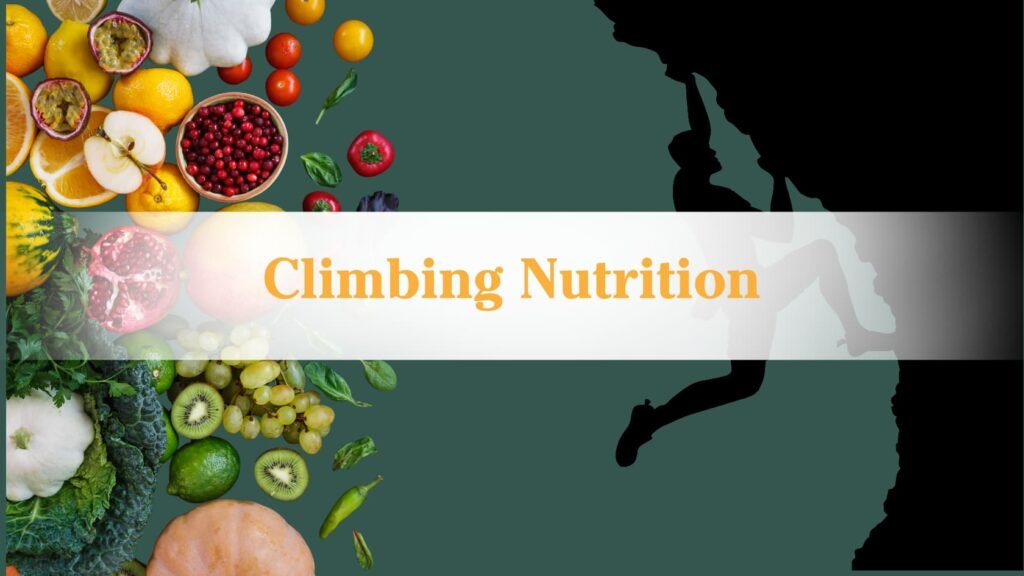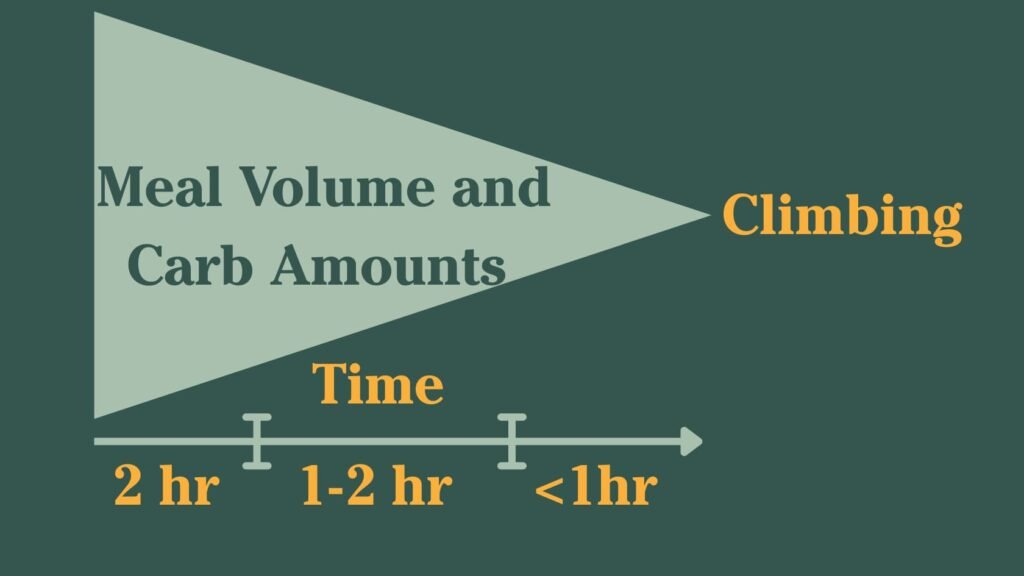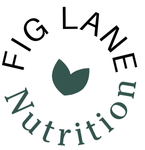Nutrition is key before climbing, especially during long or high-intensity sessions, if you want to feel energized and perform at your best.

As a registered dietitian, I often hear climbers say they’re unsure what to eat before climbing without feeling sluggish, heavy, or uncomfortable on the wall. On top of this, research suggest that climbers are not meeting carbohydrate and calorie goals which could impact performance [1,2,3]. The truth is, it’s not just about what you eat, it’s also about when you eat and what to avoid. In this post, I’ll break down what to eat before climbing based on evidence based information that can help fuel smarter, climb stronger, and recover better.
Why Pre-Climb Nutrition Matters
During high-intensity exercise, carbohydrates are the body’s preferred source of fuel, but they’re also used up quickly. And it’s not just your muscles that need them. Your brain also relies on carbohydrates, especially when you’re planning routes or solving problems on the wall. Low carbohydrate intake is associated with onset of fatigue [4]. So depending on the intensity and endurance of your climbing, it could impact performance or duration [4].
Our bodies store a limited amount of carbohydrates in the muscles and liver as glycogen. That’s where pre-climb nutrition comes in: eating the right foods beforehand helps top off those glycogen stores and provides a steady supply of energy as the food digests [4].
Benefits of Nutrition Before Climbing:
Timing Your Pre-Climb Meal
The amounts and types of foods for what to eat before climbing changes depending on when you are getting this meal in.
The longer window before climbing, the longer there is to digest food which can also mean more volume of food.
The closer to the session, the smaller the meals the easier they should be to digest.

| Time Before Climbing | Size | Contents |
| <1 hour | Small Volume | More liquid or pure carbohydrates sources. |
| 1-2 hours | Medium Volume | Easy to digest carbohydrates + small amount of protein |
| 2 hours | Medium Volume | Easy to digest carbohydrates + small amount of protein + small amounts of fiber |
| >2 hours | Medium-Large Volume | A balanced meal with protein and carbohydrates + small amounts of fiber + small amounts of fat |
<1 Hour Before Climbing
- Sports drink
- Rice cakes
- Banana
- Juice
- Dried fruit (Low fiber: mango, cranberries, cherries)
1-2 Hours Before Climbing
- Toast with jam
- Energy bar
- Fruit smoothie
2 Hours Before Climbing
- Easily digestible cereals with skim milk or low fat dairy alternative
- Fruit with a yogurt cup
>2 Hours Before Climbing
- Rice bowl with plant-based protein or lean meat and low fiber vegetables
- Breakfast tacos on corn tortillas (keep it light on the spice and dairy)
- Oatmeal with a protein powder and some fruit.
- Pasta salad with some vegetables and herbs (light oil base)
- Grilled chicken or tofu Caesar salad wrap
Common Pre-Climb Nutrition Mistakes (and How to Avoid Them)
Snippet from next weeks article on Top 3 Pre-Climb Nutrition Mistakes. Sign up for our newsletter here to say up to date on weekly articles.
Skipping meals
A pre-workout meal is meant to top off muscle carbohydrate stores (glycogen) and blood glucose levels. If you are skipping meals earlier in the day, had a heavy workout the day before, or are thinking the whole day, then you are not topping of stores. That means you are repleting, or running low, on your stores without putting anything back.
Eating too much fiber or fat too close to session
Ever get a stomach cramp with exercise after eating? This was probably part of the problem. Too much fiber or fat can be hard to digest for anyone. If we are eating high fiber/high fat foods right before exercise, our body is left trying to figure out what to do. It tends to get confused between digesting our food or sending resources to our muscles. That cramp your feeling is from your body trying to push/pull too many resources from your gut without proper support from the rest of your body.
Under-hydrating
Hydration before climbing is important for performance [6]. You cannot properly hydrate yourself during climbing, if you started climbing dehydrated. With any of these pre-workout meals it is a very good time to also look at getting additional hydration through water, sports drinks, or high fluid foods (soups, fruits, certain vegetables, or juices).
Nutrition for Performance vs Nutrition for Longevity
While many of the pre-climb meal options mentioned above are not nutrient free, nutrition for performance and nutrition for longevity don’t always align perfectly. Understanding your goals, whether you’re training to climb harder or simply climbing for health and enjoyment, can help you strike the right balance.
For climbers who are training at a high level, the pre-climb meal is often just one small part of a well-structured daily nutrition plan. In these cases, prioritizing fast-digesting, performance-focused foods (like refined carbs or lower-fiber meals) can make sense, even if they aren’t the most nutrient-dense options.
On the other hand, if climbing is your main form of movement for the day, and you’re climbing for fun, fitness, or general well-being, it may be more appropriate to choose a pre-workout meal that supports long-term health. This might include more whole foods, fiber, or healthy fats, even if it slightly impacts immediate performance.
Ultimately, there’s no one-size-fits-all. Being intentional about your goals, performance vs. longevity, can help you make more personalized and sustainable nutrition choices.
Conclusion: Fueling Climbing the Right Way
Knowing what to eat before climbing can significantly impact how you feel and perform, whether you’re sending hard routes, enjoying a day at the gym, or simply climbing for fun and fitness. The key is to find the right balance between performance-focused and longevity-supporting nutrition based on your goals, schedule, and training demands.
Proper pre-climb nutrition can help you:
- Improve endurance [4]
- Improved muscle energy stores [4]
- Recover more efficiently after your session [5]
Everyone’s needs are different, so don’t be afraid to experiment and adjust your pre-climb meals over time. A small change, like eating a banana an hour before your session or swapping in a more balanced meal earlier in the day, can make a big difference.
Want More Climbing Nutrition Tips?
For more on climbing nutrition articles, more on plant-forward nutrition, nutrition guides, and easy recipes, subscribe to our newsletter or check out our freebies section. You’ll get a helpful tool to support your nutrition strategy, plus regular updates, exclusive content, and more.
👉 [Sign up here] to get your free resource and join the community!
